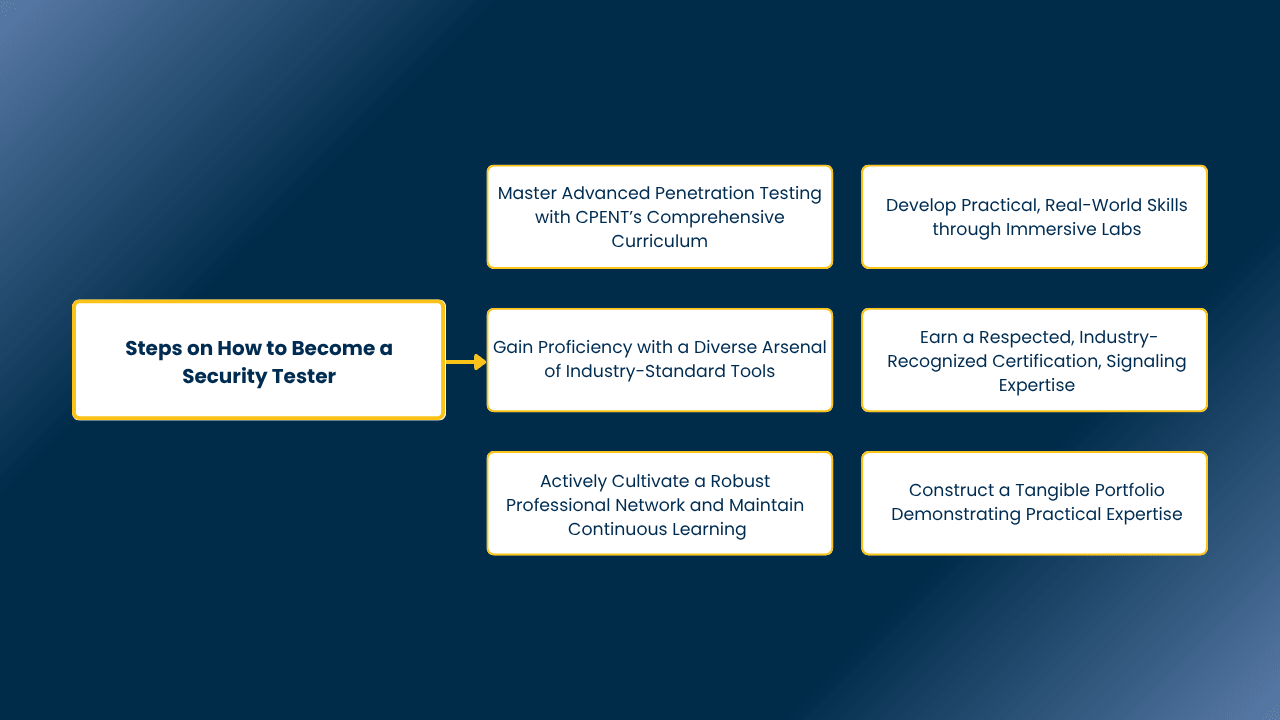How to Become Security Tester After Doing cPent Certification

In the digital era, security is no longer a luxury, but a necessity. From the protection of sensitive customer information to securing key infrastructure, organizations are perpetually under cyber attack. That’s where security testers step in. These are the first lines of defense, uncovering flaws before the bad guys do. In this blog, we will understand. What is security testing? How is it different from penetration testing? And how do you start a thriving career in this critical industry? We will help with you with the solutions to these questions and will explore how Cybersec Trainings CPENT program can help you with exceptional skills to excel in the field of cybersecurity.
What is Security Testing?
Security testing looks for the weakness in the software. It is an online security test. Security testers simulate hacker attacks, search for vulnerabilities, check security features, ensure software resists intrusion. Additionally, they see if code complies with security regulations. Therefore,it includes methods like code reviews, penetration testing, and vulnerability scanning. Furthermore, their objective is to locate and repair risks. This avoids any expensive attacks and safeguards data. Therefore, security testing protects digital system that makes software defenses robust.
Steps on How to Become a Security Tester
By mastering the advanced penetration testing skills within Cybersec Trainings’ CPENT program, you strategically position yourself for an accelerated and successful security testing career. This rigorous training not only bridges the gap between theoretical cybersecurity knowledge and real-world application, but also transforms you into a highly sought-after, indispensable asset to any security team navigating today’s complex threat landscape.
1. Master Advanced Penetration Testing with CPENT’s Comprehensive Curriculum
- Cybersec Trainings’ CPENT program delivers an intensive, in-depth curriculum focused on advanced penetration testing methodologies and techniques, building a robust and immediately applicable foundation for a high-impact security testing career.
- You cultivate the critical ability to think like a malicious actor, enabling proactive vulnerability identification and mitigation within diverse environments.
2. Develop Practical, Real-World Skills through Immersive Labs
- CPENT’s emphasis on practical, scenario-based labs and real-world simulations allows you to directly apply acquired theoretical knowledge, rapidly developing essential security testing skills demanded by industry leaders.
- You gain the practical dexterity to execute complex, real-world attack simulations, a critical competency for performing effective and accurate testing.
3. Gain Proficiency with a Diverse Arsenal of Industry-Standard Tools
- CPENT training encompasses comprehensive instruction in the utilization of a diverse arsenal of penetration testing tools, directly transferable to professional security testing engagements.
- You achieve expert-level proficiency with tools such as Metasploit, Nmap, and Wireshark, essential for conducting thorough and effective security assessments.
4. Earn a Respected, Industry-Recognized Certification, Signaling Expertise
- The CPENT certification validates your advanced penetration testing skills, providing demonstrable evidence of your expertise to potential employers and industry peers.
- This security tester certification serves as a powerful differentiator in the competitive security testing landscape, significantly enhancing your career prospects.
5. Actively Cultivate a Robust Professional Network and Maintain Continuous Learning
- Engage actively with the cybersecurity community, participating in forums, conferences, and collaborative initiatives. Continuous learning is paramount for sustained career longevity in this dynamic field.
- Actively cultivating connections within the community is a key method to stay abreast of emerging threats and evolving security best practices.
6. Construct a Tangible Portfolio Demonstrating Practical Expertise
- Meticulously document your findings from CPENT labs and exercises, showcasing your ability to identify, exploit, and remediate vulnerabilities.
- This portfolio provides concrete, verifiable evidence of your practical abilities to perform real-world security testing, solidifying your credentials.
Salary and Job Opportunities of a Security Tester in 2025
A career as a security tester provides both financial stability and professional growth. Cybersec Trainings’ CPENT program directly enhances your marketability, opening doors to high-paying positions and specialized security tester roles and responsibilities within the cybersecurity field.
| Feature | Description |
|---|---|
| Average Cyber Security Penetration Tester Salary | ₹24.2 lakhs per year |
| Security Tester Salary Range | ₹15.8 lakhs to ₹70.2 lakhs per year |
| Top 10% Earnings | Exceed ₹46.3 lakhs per year |
| CPopular Penetration Testing Companies | Infosys, Publicis Sapient, Amdocs, CGI, OneAdvanced, QualiZeal, Wohlig Transformations, Aexonic Technologies, NUK 9 Information Security Auditors |
| Job Titles | Security Test Engineer, Security Tester, Cyber Security Tester |
| Key Skills | Application Security, Web Application Security, Penetration Testing, VAPT, Vulnerability Assessment |
| Freelance Opportunities | Available, offering flexibility but requiring client acquisition efforts. |
| CPENT Impact | CPENT certification significantly enhances earning potential and career advancement within the Indian market. |
| Training benefits | Cybersec trainings’ CPENT training keeps you up to date with the latest threat, increasing your market value. |
Role of Pentesting Certification in Career Growth
Penetration testing certifications are vital for career advancement in cybersecurity. They validate your skills, boost your earning potential, and unlock opportunities in specialized areas like web application and cloud penetration testing.

Benefits of Penetration Testing Course and Certifications
1. Demonstrates Expertise
Certifications, like CPENT, provide tangible proof of your advanced penetration testing skills to potential employers. Cybersec Trainings’ CPENT program, with its rigorous practical exams, ensures you possess real-world expertise.
2. Increased Earning Potential
Certified penetration testers often command higher salaries. The CPENT certification, offered by Cybersec Trainings, equips you with in-demand skills, making you a highly valuable asset.
3. Career Advancement
Certifications can propel you to leadership roles. Cybersec Trainings’ focus on advanced techniques through CPENT prepares you to lead penetration testing teams and manage IT security.
4. Specialized Roles
CPENT training allows you to specialize in advanced penetration testing, including network penetration testing, and client side attacks. This aligns with the industry’s demand for specialized expertise.
5. High Demand
The cybersecurity industry faces a critical shortage of skilled professionals. Cybersec Trainings’ CPENT program addresses this demand by producing highly competent penetration testers.
6. Improved Job Security
As cyber threats evolve, skilled penetration testers are essential. Cybersec Trainings’ CPENT program provides continuous skill development, ensuring you remain relevant.
7. Understanding of Hacker Tactics
CPENT training simulates real-world attacks. You learn to think like an attacker, enabling you to better protect organizations.
8. Risk Assessment
Penetration testers identify and mitigate risks. Cybersec Trainings’ CPENT program provides the skills to conduct comprehensive vulnerability assessments. Cybersec Trainings’ CPENT certification stands out for its emphasis on practical, hands-on training. It validates your ability to perform complex penetration tests in real-world scenarios. This security tester certification demonstrates that you possess the advanced skills employers seek. In a dynamic cybersecurity landscape, CPENT from Cybersec Trainings is a powerful tool for career growth.
Difference Between Security Testing and Penetration Testing
Mastering both security testing and penetration testing in cyber security is essential for a comprehensive cybersecurity approach. Cybersec Trainings’ CPENT program provides the advanced skills to excel in these critical areas, ensuring you’re prepared for the dynamic challenges of modern security.
| Features | Security Testing | Penetration Testing |
|---|---|---|
| Scope | Broad, covering various security exercises. | Narrow, a specialized type of security exercise. |
| Depth | Broad but shallow analysis of the system. | Narrow but deeper analysis, focusing on exploitable vulnerabilities. |
| Vulnerability Identification | Identifies potential vulnerabilities. | Identifies real vulnerabilities with risk scores. |
| Exploitation | Does not exploit vulnerabilities. | Actively exploits vulnerabilities to assess impact. |
| Remediation Guidance | Provides general security recommendations. | Offers detailed remediation guides for fixing vulnerabilities. |
| Application | Suitable for companies seeking a general security overview. | Essential for companies with sensitive data and existing security protocols. |
| Timeline | Can be completed in minutes to hours for basic scans. | Takes 4-10 days depending on the scope. |
| Reporting | Lists potential vulnerabilities with some recommendations. | Detailed reports with risk scores and remediation guidance. |
Conclusion
A career in security testing offers both immense challenges and rewarding opportunities. As cyber threats evolve, the demand for skilled security tester continues to grow. Understanding the nuances of security testing and penetration testing is essential for effective defense. Cybersec Trainings’ CPENT program provides the practical, hands-on training that empowers you to excel in this dynamic field. By mastering advanced penetration testing techniques and gaining industry-recognized certifications, you can become a valuable asset to any organization. Remember, security is not a destination, but a journey of continuous learning and adaptation. With the right skills and dedication, you can play a crucial role in securing our digital future.
Understand how Orbus can help your career!
Speak with an Expert Now!
FAQ's
What practical experience should you have post-certification?
Post-certification, prioritize hands-on experience. Participate in CTFs, contribute to open-source projects, build a home lab, seek internships, and create a portfolio. Bug bounty programs offer real-world experience. Continuous practice is crucial.
What career paths are available after becoming a certified penetration tester?
CPENT opens doors to roles like Penetration Tester, Security Analyst, Vulnerability Assessor, Security Consultant, Security Engineer, Incident Responder, and Security Auditor. You can specialize in areas like cloud or IoT security.
Are there specific industries where security testers are in higher demand?
High-demand industries include Finance, Healthcare, Technology, Government, E-commerce, Critical Infrastructure, and Legal. Any sector handling sensitive data or critical infrastructure needs skilled security testers.





